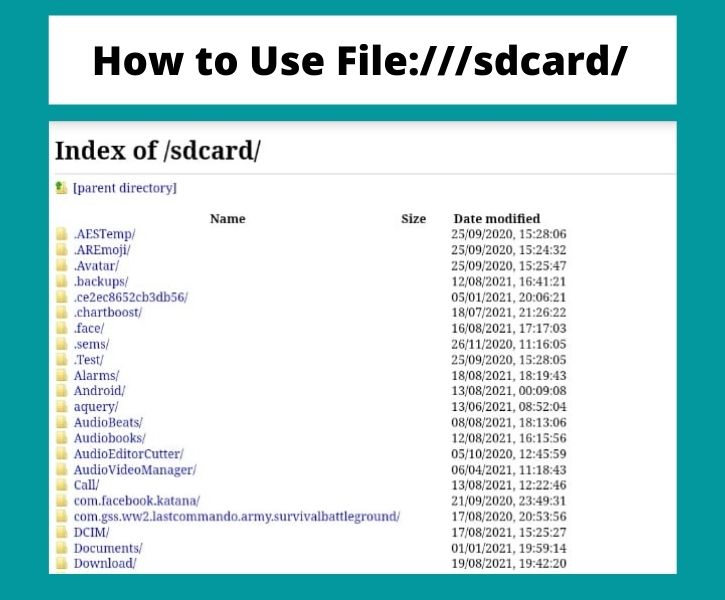Android devices store a variety of information in file:///sdcard/ Folder, which are used to keep track of the device’s data and its associated files. The file sdcard command is useful for accessing the internal memory of the device.
With this function you can enter your documents through the browser. Here’s the basics so you can learn how to use file:///sdcard/ to view your files on the Android operating system.
How to access files from internal memory on Android?

As we pointed out, many people do not know it, but through browsers it is possible to explore all the folders on our mobile. It is a valid option if you want to keep everything minimalist, since it does not require downloading extra applications, such as the well-known file explorers.
To access the internal memory using the command file:///sdcard/, it will be necessary to use a browser. You can use the one you want, since Chrome, Mozilla or Opera work , as well as any other you use.
To use it, simply open your browser and in the address bar type the command ‘file: /// sdcard /’. Immediately type this command, press the ‘Enter’ key on the keyboard of your Android device.
You will see that the index will be displayed with the folders of the internal memory of the device. You just have to browse through these folders to see the content present there.
In fact, you will be able to open image or video files without limitations, since browsers have support for this type of document. On the other hand, if this function is not entirely useful, you can use file explorer .
Also Read: Advanced Systemcare 12.3 -Real Time Protection For Your Computer
Exploring the file:///sdcard Path on Android Devices
The File System Hierarchy on Android: When it comes to file storage on Android, it’s important to grasp the file system hierarchy. We’ll delve into the internal storage and external storage, including the benefits of using an SD card for expanded storage capacity.
Understanding the file:///sdcard Path: At the heart of Android’s external storage system lies the file:///sdcard path. This section will demystify the path, explaining its structure, significance of the “file://” prefix, and the dynamic nature of the “sdcard” element.
Accessing Files Using the file:///sdcard Path: Discover how the file:///sdcard path acts as a gateway to accessing files on your SD card. We’ll explore the different methods apps employ to read from or write to files residing in this path.
Additionally, we’ll emphasize the importance of permissions and security measures to safeguard your data.
Working with the file:///sdcard Path: This section will illustrate various practical scenarios where the file:///sdcard path comes into play.
From managing files using file managers to leveraging built-in Android functionalities, we’ll explore how users can navigate, organize, and interact with their SD card files. We’ll also address any potential limitations or challenges that may arise in the process.
Best Practices and Tips : To ensure optimal file management, we’ll provide you with essential best practices for organizing files on your SD card.
Additionally, we’ll offer tips to mitigate potential issues when working with the file:///sdcard path, such as unintended file modifications or deletions. Troubleshooting common problems related to file paths and SD card access will also be covered.
How does an file:///sdcard/ file help organize and store data?
The file:///sdcard/ is an essential tool for organizing and storing data. It allows users to store files in a structured way, making it easier to find and access them.
It also helps reduce the amount of space needed on the device by compressing files, which makes it a great solution for managing large amounts of data.
Additionally, the index file can be used to quickly search for specific files or categories of data, making it an invaluable asset for any user who needs to organize their digital assets.
Also Read: Understanding the Purpose of content://com.android.browser.home/
The Benefits of Using file ///sdcard/ in Your Android System
The file path “/sdcard/” in an Android system refers to the root directory of the external storage, typically an SD card or similar removable storage device.
The index file ///sdcard/ is a powerful tool that can help you keep your Android system organized and running smoothly. This index file acts as an index of all the files stored on your device, allowing you to quickly access the information you need.
It also helps to keep track of changes made to your device, making it easier to troubleshoot any issues or errors that may arise. Additionally, the index file can be used to back up important data in case of a device failure or other unexpected event.
Here are some of the benefits of using this file path in your Android system:
-
Additional storage: External storage, such as an SD card, provides additional storage space for your device. By using “/sdcard/”, you can easily access and manage files on the external storage device.
-
Portability: SD cards are portable and can be easily removed from one device and inserted into another. By using “/sdcard/”, you can store files that you need to transfer between devices, such as music, videos, or documents.
-
Backups: You can use the “/sdcard/” directory to store backups of important files or data on your device.
-
Flexibility: The external storage on an Android device can be used for a variety of purposes, such as storing photos, music, videos, or app data. By using “/sdcard/”, you can easily manage files across different apps and use the external storage in a way that suits your needs.
However, it’s important to be careful when managing files on external storage to avoid accidental deletions or overwriting of important data.
Also read: Removing counter.wmail-service.com Trojan from Your Computer
How to Use File ///sdcard/ to Move or Copy Files on SD Card?
The file path “/sdcard/” refers to the root directory of the external storage (SD card) on an Android device. To move or copy files on the SD card using this file path, you can follow these steps:
- Open the file manager app on your Android device.
- If you wish to move or copy a file or folder, simply use the navigation option to locate it.
- To select a file or folder, press and hold it for a few seconds.
- Tap the “Move” or “Copy” button in the toolbar at the bottom of the screen.
- In the “Move” or “Copy” dialog that appears, navigate to the “/sdcard/” directory using the file path field at the top of the screen.
- If you want to move or copy the file or folder to a specific subdirectory of “/sdcard/”, you can type the path of that directory into the file path field (e.g. “/sdcard/documents/”).
- Tap “Paste” to move or copy the file or folder to the selected location.
Depending on the file manager app you are using, the precise steps may slightly differ.. Also, be careful when moving or copying files as accidental deletions or overwriting can occur.
Exploring the Different Types of Index File Formats
index file ///sdcard/ is an integral part of any file system. They help organize and store data in an organized manner, making it easier to access and manage. With the emergence of new technologies, there has been an increase in the number of index file formats available.
Indexing is the process of making data easier to find and access. Index files, index databases and index database structures are becoming increasingly important tools for organizations to manage their data more efficiently.
By allowing users to quickly access specific information that they need, index files, databases and structures can help reduce the time it takes to retrieve data and make it easier to work with large datasets.
Also Read: Smart Square HMH: Streamline Your Workforce Management Efforts
Are there any security risks associated with using an file:///sdcard index file?
With the ever-increasing use of technology, it is important to be aware of the security risks associated with using an file:///sdcard/ index . This file is used by many devices to store data, and if not properly secured, can be vulnerable to malicious actors.
A file has a limited lifetime and must be deleted once it is no longer needed. If a file is shared with the wrong person or if it falls into the wrong hands, it will become compromised and encrypted data can be read by an unauthorized person.
This can lead to the loss of sensitive user data like passwords, bank account numbers, credit card numbers, and other private information.
These are the limitations when using file sdcard
While perfectly functional, the file: /// sdcard / command has its limitations. First of all, it is not a very attractive system on a graphical level. In fact, the folders will be listed , as well as the files you have stored on the device.
In other words, thumbnails or any other function that helps you locate files more easily will not be displayed. The command or file: /// sdcard / will simply help you navigate quickly without downloading extra applications. As we noted, it is a useful feature, but not for everyone.
Where is the SD card folder on Android?
SD memory has its own identifier in file browsers, so the name / address changes depending on how much memory you have. In any case, you can’t access them using the file ///sdcard/ command. It is advisable to use a file explorer to view the documents stored on the SD card.
Normally micro SD memory works as an extra storage option. For this reason, applications such as WhatsApp save all the content in the internal memory.
In fact, it is advisable to free up memory in WhatsApp, so that it does not take up so much space. In turn, using the file explorer can help you to have more storage on your mobile phone.
Blog Suggestion: What Is Miswebmail And How To Reset Password
How does the files to SD card app work?
The App Files to SD card application is functional to quickly move files from the internal memory of the device to the SD card. This application is functional to free space in the internal memory that usually fills up as we use the cell phone.
Downloading the App Files to SD card application, makes it possible to make a quick backup of all your files, keeping the internal memory more free.
It should be noted that this is not the same as directly installing the applications on the SD card, but it can be an excellent alternative to free up space. In particular, it is useful for moving WhatsApp files, which tend to take up a lot of storage on the device.
Can I use the ‘file: /// sdcard /’ option on a computer?
If your computer has the Android operating system, you can use the file: /// sdcard / function. On the other hand, if you want to connect remotely to view the files on the device, the process is different. It will be necessary to access an ftp server using Fillezilla or another similar program.
In fact, the File Manager by Xiaomi application that we mentioned before is functional to access the mobile files remotely, very similar to how we do it with the file: /// sdcard / command. Just download the file explorer, access the ftp section and configure the server. After this, enter the data in the Filezilla program and you will be able to access your files.
Blog Suggestion : Techfelts : Extensive Solution to Recover Deleted Photos
Frequently Asked Questions
How can I access the internal memory of my device?
The internal storage space on your smartphone is limited. Use your device as a removable storage device, and use it as a smart card to access the internal memory of your device. This will let you store and retrieve images, music, videos, documents, etc
How do I know if my device has internal memory?
Why don’t you know what your device has internal memory? It is simple. Your device can have internal memory of the following types:
System memory: This refers to RAM that is reserved for use by the operating system and the user’s applications. It can be used to store files, programs, or libraries.
Internal storage: This refers to a non-removable internal memory device such as a flash drive or card reader.
What are the benefits of using the sdcard command?
The sdcard command allows you to take a single file on your computer and place it in the SD card. This is useful for saving files and data that you might have copied to the SD card. . If you do not have an SD card, you can use this command to copy files to a file.
The sdcard command finds the card in the computer and attempts to read from it using block mode. If it can’t read from the card, or if it failed to find any files on the card, then an error message is displayed in your system log that identifies which file format was used. For example: sda1:/sdcard/testfile-3
What is the file:///sdcard/ command?
file:///sdcard/ command is simple command that is used to move files from the internal storage of a device to the external storage. Moreover, this command is also useful in one way or another in Android. It can be considered as a file transfer tool between internal storage and external storage. By using the command we can perform a quick file transfer from one device to another.
Is it necessary to use an file ///sdcard/ file for data storage?
Storing data safely is essential for any business. But with the ever-growing amount of data, it can be difficult to keep track of it all. This is where an file///sdcard/ index for data storage comes in handy. It provides a convenient way to store, organize and access large amounts of data quickly and securely.
An file ///sdcard/ file allows users to easily locate their stored data and make sure that it is secure from unauthorized access or tampering. With this index file, businesses can ensure that their valuable information is kept safe and secure at all times.
How can I use the File sdcard command to access the internal memory of my device?
The internal memory is the second storage space in your device. This is where all the data and information you save to your device are stored. It is recommended that you keep this space free for important data and files.

We are a team of enthusiastic people who want to share our experience, knowledge and enterprise with the world. We love what we do and we hope you will too!. We pride ourselves on being the global leader in developing Techspurblog as a technology blog, which can create original content.






